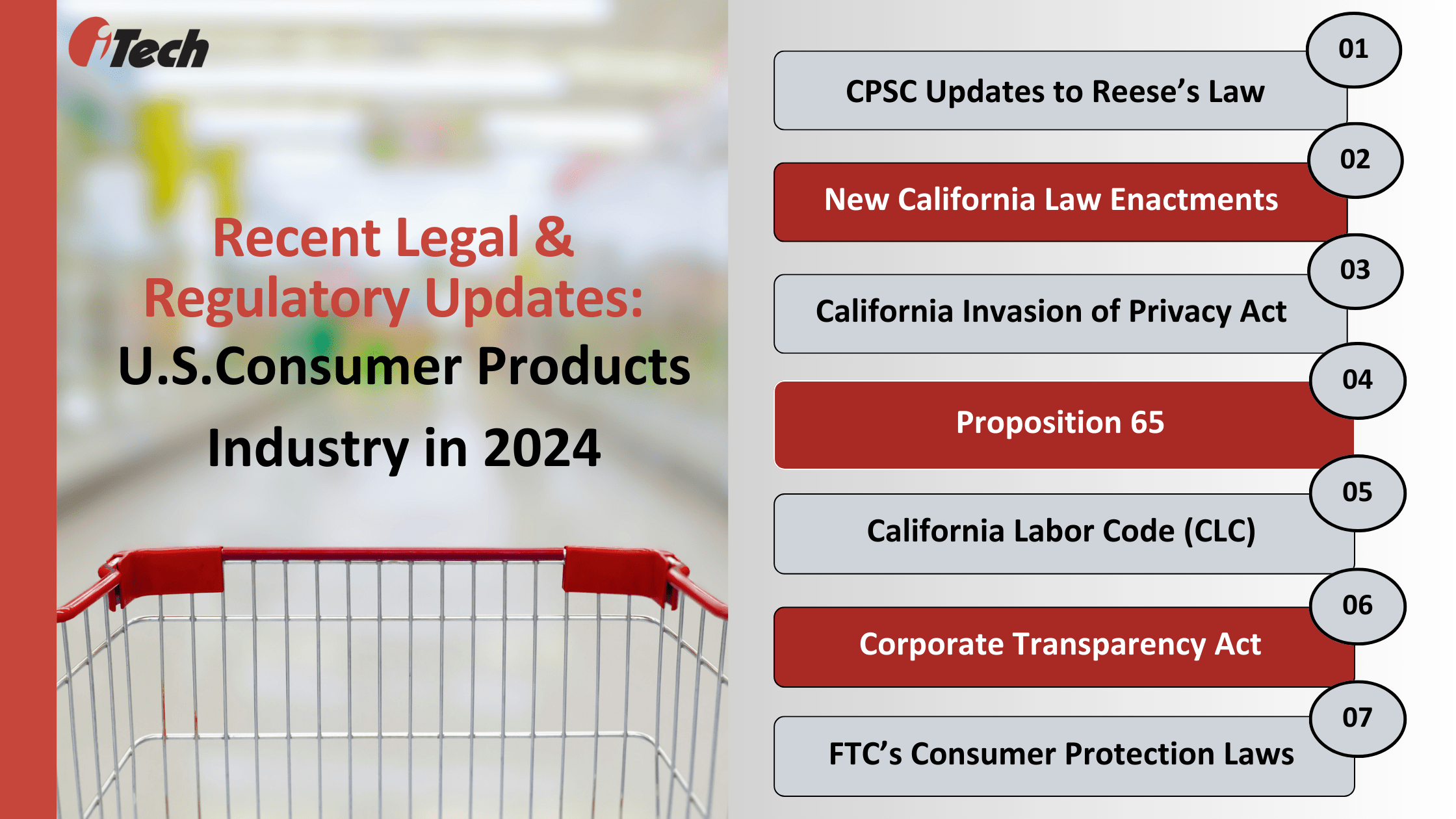2024’s Top Risks in Consumer Products Industry: Uncovering Legal Risks (Part 2)

Previously, we discovered a tapestry of trends impacting the U.S. consumer products industry in 2024. The year will be known for growing consumer awareness and resistance to rising prices. However, priorities don’t just end with matching customers’ product value, innovation, and sustainability expectations! Companies in the consumer products industry have regulatory and legal obligations to justify their branding claims about ethical practices, data privacy, labeling transparency, and sustainability commitments.
This blog lists the top legal and regulatory risks that consumer product companies must consider to prevent legal fines and reputation damage from non-compliance.
iTech GRC utilizing I.B.M. OpenPages provides seamless end-to-end regulatory compliance management. Our GRC experts can help demonstrate how enterprises can automate identifying regulatory changes to adopt relevant requirements and map them to their internal data to manage and mitigate non-compliance risks proactively.
But first, we highly recommend that you acquaint yourself with the latest legal updates for 2024!
1. CPSC Updates to Reese’s Law: For context about Reese’ Law, it was enacted in 2022, following the death of a toddler named Reese Hamsmith in December 2020, after she accidentally ingested a lithium coin cell battery. The law was drafted to remove batteries that carry the risk of ingestion hazard from the product.
The U.S. Consumer Product Safety Commission (CPSC) standard imposes strict rules on manufacturers or importers of coin cell batteries regarding product design, labeling, and packaging. It requires companies that are domestically producing or importing batteries to voluntarily certify that they meet the CPSC standard, ANSI/UL-4200A-2023, under 16 CFR § 1263.
The latest revision to the rule regarding certificates of compliance codified at 16 C.F.R. part 1110 would require importers to file certificates to the online portal, U.S. Customs and Border Protection (and the CPSC) with the U.S. Customs and Border Protection’s Automated Commercial Environment.
Potential Impact: The update to Reese’s Law will impact logistics for companies that import large quantities of products or batteries. It would be a proactive approach by companies and importers dealing with products that rely on coin-cell batteries.
2. New Law Enactments in California: California will implement many laws in 2024, requiring consumer product brands and manufacturers to screen their products for recyclability, labeling, and testing. Some of them include:
- SB 434: California Law on Truth in Recycling and Labeling SB 343 was enacted in 2021 to prevent plastic manufacturing companies from falsely labeling their products as recyclable. The law provides strict instructions against the misuse of chasing arrows symbols on the packaging.
- AB 881: In addition, California’s rule on exporting plastic waste, AB 881, regulates the practice of disposing of plastic waste into the ocean as recycling. According to the law, the jurisdiction on recycling will not be applicable when the disposed plastic waste reaches other countries after being discarded into the sea. AB 881 classifies such waste as exported plastic waste.
- AB 2208: California’s AB 2208 banned fluorescent light bulbs containing toxic chemicals like mercury. Starting January 2025, the state will ban the sales of linear fluorescent and pin-based compact lamps.
- AB 899: The AB 899 on Testing for Heavy Metals oversees testing for the presence of toxic heavy metals like arsenic, cadmium, lead, and mercury in baby food.
- AB 1200: The Safer Food Packaging and Cookware Act, AB 1200 requires manufacturers of cookware, food packaging, and many other household products to disclose if they contain PFAS or poly-fluoroalkyl substances. The presence of PFAS is linked to health hazards like congenital disabilities, cancer, and liver failure. Another provision of this law, imposed in January 2023, banned PFAS in paper food packaging.
Potential Impact: Failing to comply with regulations results in penalties, litigation, and class action lawsuits. Many brands continue to face the scrutiny of state laws and regulatory developments to monitor the far-reaching impact of their business practices on the environment, consumers, and the community. The new laws will require compliance teams to update internal practices and compliance processes to mitigate risks.
3. California Invasion of Privacy Act (CIPA) on Website Chatbots: California’s privacy law will govern companies using digital communication technologies like chatbots to communicate with customers. The law alleges that customers’ chatbot interactions are a communication record, violating CIPA’s wiretapping rule. Many consumer product companies use chatbot-based online agents, which a third-party vendor or service provider provides. The website operators will be charged for ‘eavesdropping’ or ‘aiding’ and ‘abetting eavesdropping’ on their website by the chatbot provider, thereby falling under CIPA’s radar for wiretapping.
Potential Impact: In 2023, several companies were scrutinized by state and federal courts around California. The cases had confounding effects, with some courts dismissing the lawsuit and others acting in part or in whole on significant risk from third-party entities who may identify and harm customers from conversations with Chatbots.
4. Proposition 65: California Proposition 65, short for Safe Drinking Water and Toxic Enforcement Act of 1986, prevents hazardous chemical contamination of drinking water sources. It requires businesses to disclose the presence of chemicals to California residents. Last year, the law was actively implemented across the state consumer product industry, including personal care products, fashion merchandise, retail goods, confectionery and baked products, automotive parts, and nutritional supplements.
In 2024, we can expect more industries to be included under Proposition 65, which requires manufacturers to provide clear and understandable information on product packaging and labeling regarding the potential impact of chemicals such as reproductive damage and cancer.
Potential Impact: The Office of Environmental Health Hazard Assessment (OEHHA) is expected to implement proposed amendments to consumer warnings on product packaging or online sales. The deadline for public comment was extended to January 2024. Consumer product companies can expect the agency to wrap up the wait and implement new warning notices for their product labeling soon.

5. California Labor Code: California employers must note new California workplace laws. Below is the list of laws that are soon slated for enforcement:
- SB 497 Presumption of Employer Retaliation in the California Labor Code: This bill ensures the protection of employees who are engaged in certain protected conduct as per Labor Code section 98.6 or 1197.5 (exercising rights under California Equal Pay Act, participation on Labor Commission Claim or any lawful, off-duty conduct) against adverse employment action. Additionally, the bill requires defaulting employers to compensate $ 10,000 per employee for each violation.
- SB 616 Increase to Minimum Paid Sick Leave: This law requires companies to increase the minimum total accrual cap of paid sick leave from three days to ten day
- SB 848 New Reproductive Loss Leave: Any employers with five or more employees working in their organization who have worked for at least a month (with five consecutive workdays) must sanction reproductive loss leave to employees affected by miscarriage, failed adoption, stillbirth, or unsuccessful assisted reproduction.
- SB 553 Mandatory Workplace Violence Prevention Plan and Injury and Illness Prevention Plan: This law came into effect on July 1st, 2024, and mandates that all employers impart training on the Workplace Violence Prevention Plan (WVPP) and Injury and Illness Prevention Plan (IIPP). The law requires the WVPP and IIPP to be disclosed to all employees, authorized representatives, and stakeholders in written format.
- AB 636 Wage Theft Prevention Notice Additions: This law amends the Wage Theft Prevention Notice under Labor Code section 2810.5, requiring employers to provide wage and employment notices to new hires. The amendment mandates employers to disclose additional details in the WTPN regarding federal and state emergency declarations applicable to the employees’ countries, which can potentially impact their health and safety.
Potential Impact: A string of new rule enactments under the California Labor Code will increase the risk of class actions for employers in California. Averting risks and legal inspections may require preventive measures like adopting policies that broadly benefit employees’ well-being and protect their interests during employment.
6. Corporate Transparency Act (C.T.A.): Enacted on January 01st, 2024, the C.T.A. mandates all newly established or existing business organizations to disclose their beneficial ownership information (BOI) to the U.S. Department of the Treasury’s Financial Crimes Enforcement Network (FinCEN). The law exists to prevent money laundering and tax evasion activities and imposes penalties against entities that fail to report or misreport.
Impact on Consumer Product Companies: The C.T.A. may not apply to large operating companies, publicly listed firms, regulated entities, and other businesses that adhere to exemption criteria. Additionally, businesses that are not L.L.C.s and business corporations whose inception involved filing a document with the secretary of the state are also exempt from filing BOI.
7. Federal Trade Commission (F.T.C.) Consumer Protection Law Enforcements: Under the Biden administration, the F.T.C. aggressively enforced several consumer protection actions. Nearly 90% of its enforcements are in financial services, telecommunications, healthcare, web services, and retail industries. Under the retail sector, the commission has settled 26 enforcements on product labeling, marketing, deceptive branding endorsements, consumers’ right to repair, and data privacy practices. The F.T.C.’s proposed rule includes:
- Hidden and Junk Fees: The F.T.C.’s newly proposed rule would remove the practice of imposing “hidden” and “junk” fees. The commission also said that hidden fees are generally revealed towards the end of the transaction and cost over $10 billion annually.
- Auto-renewal of Payments and Subscriptions: The F.T.C. proposes revisiting its regulations on companies offering recurring payment services. According to the commission, recurring payment modalities benefit both customers and companies but are often taken undue advantage of by businesses. The new rule aims to minimize complex cancellation mechanisms for consumers and track how payment reminders are sent during renewal.
- Customer Reviews and Testimonials: The F.T.C. plans to review its existing guidelines on using customer reviews and testimonials in brand or product advertising. In 2023, the commission tweaked some of its guidelines related to disclosures on social media, videos, and online platforms. The F.T.C. plans to revisit rules to manage negative reviews, rewards for customer reviews, and more.
If you want a unified view of risks and the ability to classify complex regulations using A.I. capabilities within OpenPages, Reach out to us.
Our certified GRC specialists are experienced in consumer products manufacturing, packaging, supply chain, logistics and distribution, and retail industries.
Talk to our experts today!
